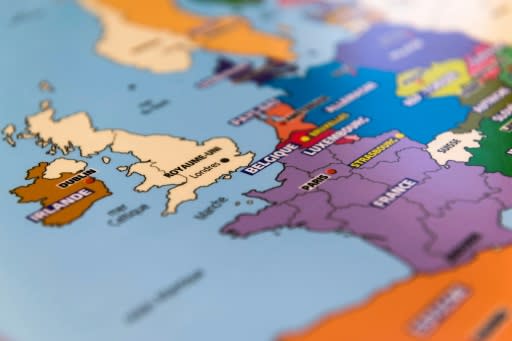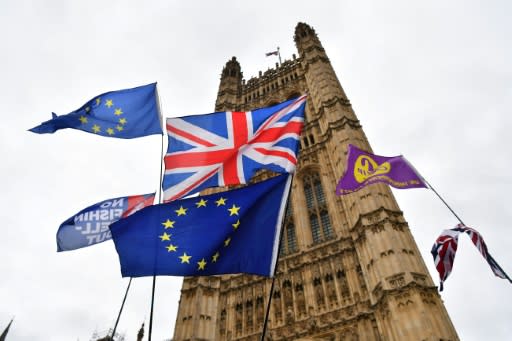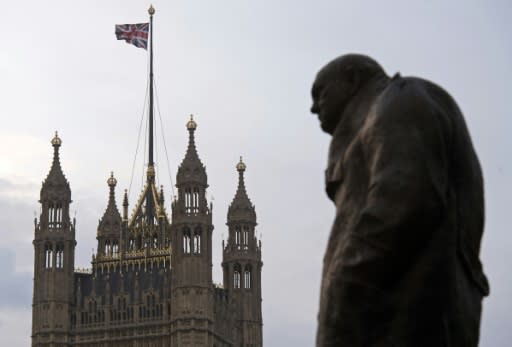Sceptical Isle: Britain's story foreshadowed Brexit
In September 1946, surveying the ruins of a continent ripped apart by war, Winston Churchill could see only one way to rebuild and preserve peace. "We must build a kind of United States of Europe," Britain's victorious war time leader told Zurich University even if, a few phrases later, he stressed: "We British have our own Commonwealth of Nations." Today, Prime Minister Boris Johnson -- who once wrote a biography of Churchill -- led Britain out of the European Union, 47 years after it joined. Another 27 countries remain and several more are keen to join, but Britain has always been an awkward fit. Does its island history explain why? - Parting of the waves - Until around 6500 BCE, the rocky promontory that would become Great Britain was attached to the coast of mainland Europe by "Doggerland". As the Ice Age glaciers retreated, the hills and swamps that would become the North Sea bed were flooded, and Britain stood alone. There were Mesolithic humans on both shores, and British and European history would remain closely entangled, but also somehow divided. - Island of immigrants - Celtic tribes from the mainland displaced or mixed with pre-historic Britons and some, like the Belgae and the Dumnonii, lived on both sides of the Channel. Invasion by the Roman Empire bound the archipelago into the Classical world until the fifth century then -- as the legions left -- Angles, Saxons, Jutes and Scots arrived. Various generations of Scandinavians raided and settled, until the Norman invasion of 1066 brought most of the island under a French-speaking monarchy. With continental rulers, the influence of the Catholic church was consolidated, and for a while the kings of England held vast tracts of land in what would become modern France. - Turning point - Under Henry VIII, England left the Roman church, putting the island on a collision course with the Catholic crowned heads of Europe. In 1558, the forces of Mary Tudor, Queen of England and Ireland, lost control of the port of Calais to the French, and Britain's history began to diverge from that of the mainland. Elizabeth I defeated a Spanish invasion fleet in 1588, and her kingdom turned its eyes to the sea, becoming a maritime power rather than continental one. French historian Francois-Charles Mougel sees this as a "180-degree" pivot that would set Britannia apart from its neighbours, perhaps for good. Of course, ties with the mainland were not cut. The British royals intermarried with the great houses of Europe, trade often flourished and wars often erupted. But by the 19th century -- after the British Empire had allied with smaller continental powers to defeat Napoleonic France -- London ruled a global domain. - World at War - In the first half of the 20th century Britain would again become embroiled in fighting on mainland Europe in two world wars. Britain, while it had been bombed, had escaped invasion and avoided both Nazi tyranny and a Communist post-war takeover -- reinforcing its sense of splendid isolation. "There was a brief period after the Second World War when the Brits genuinely believed that we were at the height of our powers," said Anand Menon, professor of European Politics and Foreign Affairs at King's College London. Along with Britain's dominions and colonies there was another alternative ally, as Churchill's French wartime rival and comrade General Charles de Gaulle knew all too well: the United States. With the Empire starting to break up, Britain fell back as much on a "special relationship" with Washington than it did on Europe. - 'Le Non' - France was also a shrinking empire in search of a role, and it thought it had found one in the emerging European Community. In 1963 and 1967, De Gaulle vetoed British requests to join the bloc, fearing a loss of influence for Paris to Britain, with its close ties to the US. They would have to wait until 1973, and the French presidency of George Pompidou, to join what was to become known later as the European Union. "One of the things the French made sure the European Union did before we joined was rigging its budgetary arrangements so they didn't work for us," Menon, who founded the think tank Britain in a Changing Europe, told AFP. "Part of that was to lock in a system with a view to the Brits joining, and within 18 months of us joining we were complaining about the budget rules." - Europe a la carte - But Britain's sense of distance did not end there. Although as a young, up-and-coming Conservative, Margaret Thatcher had been a convinced European, she soon clashed with Brussels. While the core European countries were pushing for deeper political and legal union, Britain was pushing for a wider, looser freewheeling common market. London championed the arrival of former Soviet-bloc members keen to taste the fruits of capitalism, and resisted regulatory integration. Even the 1994 opening of the Channel Tunnel did not close the divide. Thatcher was succeeded by the relatively europhile John Major, then Labour's Tony Blair, who pledged to govern from the "heart of Europe" -- but London kept and expanded its opt outs from core EU rules. Britain received a rebate on its dues, never joined the Schengen passport-free zone and most famously did not join the union's most ambitious project: the euro. Then in 2016, faced with a tide of eurosceptic populism from his right flank, Prime Minister David Cameron tried to heal the Dogger Divide once and for all with a referendum on EU membership. And, once again, Britain pivoted away from the continent. After almost five decades in the community that has become the European Union, the United Kingdom left its institutions on January 31 A map featuring the European Union without Britain Britain has always been something of an awkward fit in the EU 'We must build a kind of United States of Europe,' said Winston Churchill in 1946 Britain will return to a blue and gold passport design after the country leaves the European Union






